#language meta
Text
Every now and then I think about how subtitles (or dubs), and thus translation choices, shape our perception of the media we consume. It's so interesting. I'd wager anyone who speaks two (or more) languages knows the feeling of "yeah, that's what it literally translates to, but that's not what it means" or has answered a question like "how do you say _____ in (language)?" with "you don't, it's just … not a thing, we don't say that."
I've had my fair share of "[SHIP] are [married/soulmates/fated/FANCY TERM], it's text!" "[CHARACTER A] calls [CHARACTER B] [ENDEARMENT/NICKNAME], it's text!" and every time. Every time I'm just like. Do they though. Is it though. And a lot of the time, this means seeking out alternative translations, or translation meta from fluent or native speakers, or sometimes from language learners of the language the piece of media is originally in.
Why does it matter? Maybe it doesn't. To lots of people, it doesn't. People have different interests and priorities in fiction and the way they interact with it. It's great. It matters to me because back in the early 2000s, I had dial-up internet. Video or audio media that wasn't available through my local library very much wasn't available, but fanfiction was. So I started to read English language Gundam Wing fanfic before I ever had a chance to watch the show.
When I did get around to watching Gundam Wing, it was the original Japanese dub. Some of the characters were almost unrecognisable to me, and first I doubted my Japanese language ability, then, after checking some bits with friends, I wondered why even my favourite writers, writers I knew to be consistent in other things, had made these characters seem so different … until I had the chance to watch the US-English dub a few years later. Going by that adaptation, the characterisation from all those stories suddenly made a lot more sense. And the thing is, that interpretation is also valid! They just took it a direction that was a larger leap for me to make.
Loose adaptations and very free translations have become less frequent since, or maybe my taste just hasn't led me their way, but the issue at the core is still a thing: Supernatural fandom got different nuances of endings for their show depending on the language they watched it in. CQL and MDZS fandom and the never-ending discussions about 知己 vs soulmate vs Other Options. A subset of VLD fans looking at a specific clip in all the different languages to see what was being said/implied in which dub, and how different translators interpreted the same English original line. The list is pretty much endless.
And that's … idk if it's fine, but it's what happens! A lot of the time, concepts -- expressed in language -- don't translate 1:1. The larger the cultural gap, the larger the gaps between the way concepts are expressed or understood also tend to be. Other times, there is a literal translation that works but isn't very idiomatic because there's a register mismatch or worse.
And that's even before cultural assumptions come in.
It's normal to have those. It's also important to remember that things like "thanks I hate it" as a sentiment of praise/affection, while the words translate literally quite easily, emphatically isn't easy to translate in the sense anglophone internet users the phrase.
Every translation is, at some level, a transformative work. Sometimes expressions or concepts or even single words simply don't have an exact equivalent in the target language and need to be interpreted at the translator's discretion, especially when going from a high-context/listener-responsible source language to a low-context/speaker-responsible target language (where high-context/listener responsible roughly means a large amount of contextual information can be omitted by the speaker because it's the listener's responsibility to infer it and ask for clarification if needed, and low-context/speaker-responsible roughly means a lot of information needs to be codified in speech, i.e. the speaker is responsible for providing sufficiently explicit context and will be blamed if it's lacking).
Is this a mouse or a rat? Guess based on context clues! High-context languages can and frequently do omit entire parts of speech that lower-context/speaker-responsible languages like English regard as essential, such as the grammatical subject of a sentence: the equivalent of "Go?" - "Go." does largely the same amount of heavy lifting as "is he/she/it/are you/they/we going?" - "yes, I am/he/she/it is/we/you/they are" in several listener-responsible languages, but tends to seem clumsy or incomplete in more speaker-responsible ones. This does NOT mean the listener-responsible language is clumsy. It's arguably more efficient! And reversely, saying "Are you going?" - "I am (going)" might seem unnecessarily convoluted and clumsy in a listener-responsible language. All depending on context.
This gets tricky both when the ambiguity of the missing subject of the sentence is clearly important (is speaker A asking "are you going" or "is she going"? wait until next chapter and find out!) AND when it's important that the translator assign an explicit subject in order for the sentence to make sense in the target language. For our example, depending on context, something like "are we all going?" - "yes" or "they going, too?" might work. Context!
As a consequence of this, sometimes, translation adds things – we gain things in translation, so to speak. Sometimes, it's because the target language needs the extra information (like the subject in the examples above), sometimes it's because the target language actually differentiates between mouse and rat even though the source language doesn't. However, because in most cases translators don't have access to the original authors, or even the original authors' agencies to ask for clarification (and in most cases wouldn't get paid for the time to put in this extra work even if they did), this kind of addition is almost always an interpretation. Sometimes made with a lot of certainty, sometimes it's more of a "fuck it, I've got to put something and hope it doesn't get proven wrong next episode/chapter/ten seasons down" (especially fun when you're working on a series that's in progress).
For the vast majority of cases, several translations are valid. Some may be more far-fetched than others, and there'll always be subjectivity to whether something was translated effectively, what "effectively" even means …
ANYWAY. I think my point is … how interesting, how cool is it that engaging with media in multiple languages will always yield multiple, often equally valid but just sliiiiightly different versions of that piece of media? And that I'd love more conversations about how, the second we (as folks who don't speak the material's original language) start picking the subtitle or dub wording apart for meta, we're basically working from a secondary source, and if we're doing due diligence, to which extent do we need to check there's nothing substantial being (literally) lost -- or added! -- in translation?
#translation#linguistics (sorta)#I love language so much#long post#subtitling#dubbing#transformative work#if you read all the way to the end - THANK YOU I am so impressed#localisation#this is not an academic essay but I still feel bad for not citing sources#low vs high context cultures and languages are concepts from intercultural communication studies#but idk how up to date that is or whether folks even still actually use them#I know they oversimplify things#but it helped me say what I was trying to here so shrug#languages#language soup#meta#language meta#fandom meta of sorts#thanks for the help sorting this out kayla <3#my nonsense
1K notes
·
View notes
Note
Not my native language, but the one I’m currently studying:
I find it interesting that in Japanese you don’t use a verb for “to dream”, you use the verb for “to see” (見る, miru) with the noun for “dream” (夢, yume) as its object (you don’t have a dream, you see a dream). There are also no articles or capital letters to make it easy to differentiate “seeing a dream” from “seeing Dream”.
So 夢を見た (“dream” + object marker + “saw”) would be ambiguous in the context of Sandman—did the speaker see Dream, or did they have a dream? Which is great because Dream kind of is a dream, he is the Dreaming, so to see him is to have a dream, to have a dream is to see him (or at least the part of him that is the Dreaming).
(Disclaimer: I have no idea how that’d be affected by honorific language, which uses different verbs for “to see”, but it’d hold true for casual, which is what I used above, and polite)
I assume this doesn’t come up in the actual Japanese translation, that they just call him an adapted version of "Dream" instead of translating the noun that is his name (particularly considering Yume is a Japanese name already. Maybe they'd have gone with it if Dream used she/her pronouns. Maybe even not then, because then it'd be a normal name when the original isn't)… yep looking it up in the Japanese Wikipedia page for the comics it’s ドリーム (Dorīmu).
Oh totally unrelated but while looking at the Netflix subs (to confirm that they also went with ドリーム) I found this very nice: while the dreaming is called ドリーミング (Dorīmingu), it gets assigned kanji that give it the meaning of dream kingdom/world. So the first time it shows up in the subs the assigned reading is shown in katakana next to the kanji, but after that the subs just have it in kanji (夢界). I think that’s a really neat thing you can do with Japanese, using the writing system to assign meaning that isn’t directly related to the sound and that would not be obvious from it (to someone who doesn’t know the English word, in this case).
I got a bit carried away in this ask because translation is so interesting and so complicated, and while I hate to do it I love seeing how other people do it and the choices they make
Anyway, looking forward to the fic, loved all the little snippets of it you've shared with all my heart!
This is The Place to get carried away about translation and language, I would love nothing more than for this blog to bear that designation haha.
Quoting this because I love it so much:
to see him is to have a dream, to have a dream is to see him
What a rad ambiguity! It dovetails to well with the lore on Dream and the Dreaming. The dramatic and poetic possibilities!! I also learned something new about the name Yume. That is really neat as well re: the writing system. Thank you for sharing, and for your kind words <3
#asks#the sandman#very very cool japanese language facts#language meta#language i love thee so#translation meta#the death of translation
74 notes
·
View notes
Text
Thinking about Terry Pratchett's scene in which Angua, the werewolf, explains that wolves don't have names. They know who each other are. They're right there. They don't need names.
Why do humans need names?
Because we tell stories.
8 notes
·
View notes
Photo
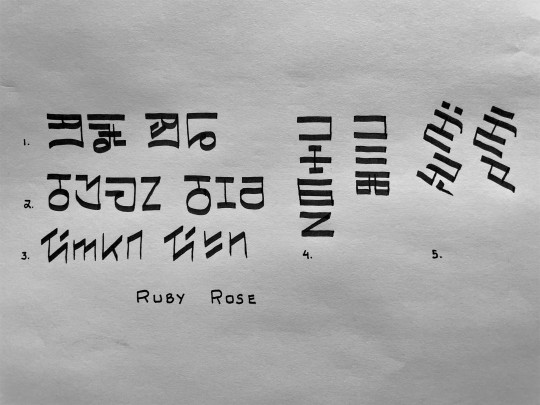
An updated look at the writing systems that I’m working on, which have undergone some changes since last time. Featuring: Ruby Rose’s name!
Alphasyllabary. This semi-featural writing system contains 100 unique characters that represent a syllabic CV pairing (or, occasionally, an independent consonant). It distinguishes between voiceless/voiced pairs (ex. [p b], [t d]) through the inclusion or omission of a macron-like bar placed above the glyph head (visually similar to the Uchen style of the Tibetan script). It can be written either horizontally left-to-right, or vertically.
Alphabet. This phonetic writing system contains 19 unique letters. At the moment, it doesn’t have any noteworthy features. It can be written either horizontally left-to-right, or vertically.
Alphabet. This phonetic writing system contains 21 unique letters. When certain letters are repeated in a word, they represent a syllabic consonant. (Ex. The word rhythm [ˈɹɪ.ðm̩], when written in this script, would be spelled something like ridmm.) The only other digraphs in this writing system are reserved for diphthongs, which are paired with a character that resembles a diamond or a parallelogram (▱). This writing system is exclusively written horizontally left-to-right.
Alphabet. This phonetic writing system contains 35 unique characters, 11 of which are ligatures derived from a handful of CC and CV pairings. This writing system is exclusively written vertically.
Abugida. This phonetic writing system contains 14 letters representing consonants, and 5 diacritics used for vowels. A 15th character is reserved as a vowel carrier, functionally reminiscent of the telco and ára used in Tolkien’s Tengwar. It generally only appears in sentences when vowels occur word-initially, or when a word contains a vowel cluster. This writing system is exclusively written vertically.
#languages#writing systems#conlang#meta content#language meta#i'm still not 100% sold on how these look but they definitely feel like an improvement
8 notes
·
View notes
Text
does Basic from Star Wars have a language that can be written with Latin characters?
I’m planning on writing a fic where the pov character doesn’t understand Basic, but my style of writing makes it hard to just brush over what they’re saying. And I don’t think I can just use the aurebesh font in ao3. (If I could, please tell me how)
if basic doesn’t have a way to be written using the Latin alphabet, would someone’s be able to help me brainstorm a way around it?
#Star wars#language meta#aurebesh#Swcw#sw#I’ve already gotten around the ‘this people don’t speak basic nor do they speak an actual written language (fictional or not)”#But I don’t want to reuse my technique for their pov#I could if I needed to but I’m not writing their pov quite yet#Tell me if I can tag this anything else
0 notes
Text

two sets of guardians, one trailblazers for the future, the other pallbearers for the past.
light -> life, hope, drive
dark -> death, futileness, stagnancy.
while one set innovated for the future the other was stuck figuring out just how to survive the end.
#homestuck#hom3stuck#theres also shape language ARRGH#jake english#grandpa harley#bro strider#dirk strider#dave strider#alpha dave#alpha rose#rose lalonde#borzoi talks#borzoi meta#homestuck meta#something something pallbearers something something i cant get over alpha session death theme#anyways#borzoi art
2K notes
·
View notes
Text
I've seen people remark on how awkward the 1967 scene is and that is so frustrating because, for me, it is one of the most emotionally resonant flashbacks in the entire series. It is so multifaceted and ripe with implication and that assertion is baffling. As though just because this conversation appears to be hard for them, it must mean that there has to be some sense of weirdness or awkwardness between them?
This scene feeds heavily into my theory that 1941 ended in some sort of aborted romantic moment between the two, most likely initiated by Crowley. Aziraphale can barely stand to look at Crowley because the very first moment he looks him in the face, he can't stop himself from giving him this hooded eyes, barely contained look of longing.
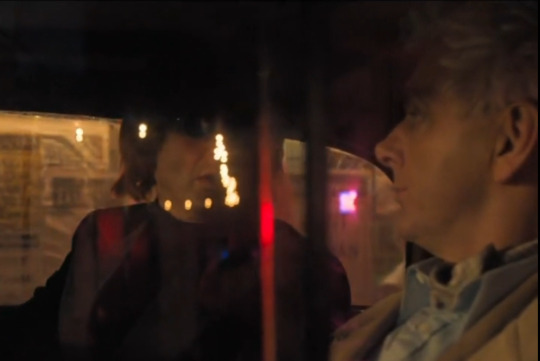
The next thing we see is Aziraphale immediately launching into a statement about his fear for Crowley's existence that is as brutally sincere as it is heartrending. His eyes are wide, his voice is heavy with emotion, and it's clear that he is terrified beyond belief to lose Crowley. Even as he acquiesces and gives him the holy water, you can see that he wants to take it back and deny him it all over again.
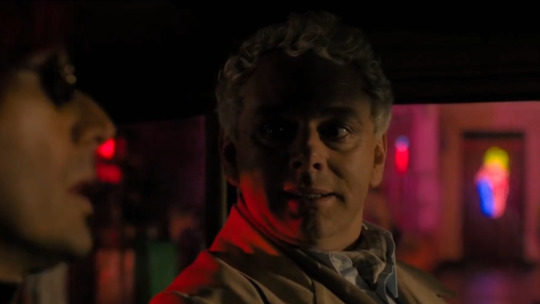
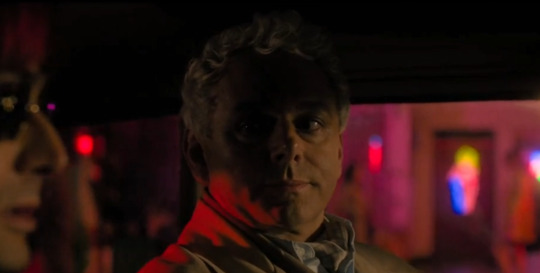
Then, of course, Crowley asks if he can give him a lift, which is definitely something that they both know is a totally different question than what lies on the surface, given that they're mere feet from the bookshop and at first Crowley frowns so deeply that it's almost cartoonish but a moment after Aziraphale turns him down you get this glimpse of very real sadness:
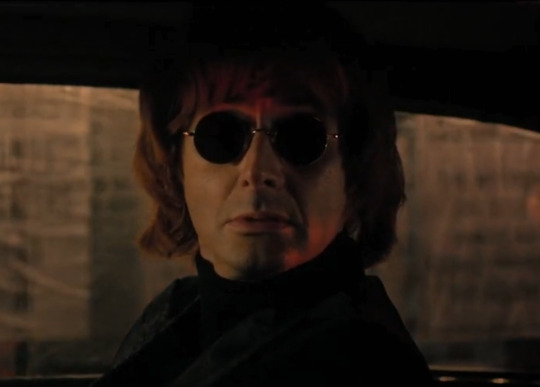
Aziraphale sees it for what it is and in an attempt to comfort him, without being able to do what currently seems impossible to him, shares a fanciful but resigned fantasy about spending time together unbothered and unrestrained, all to the tune of these tight little, loving smiles:
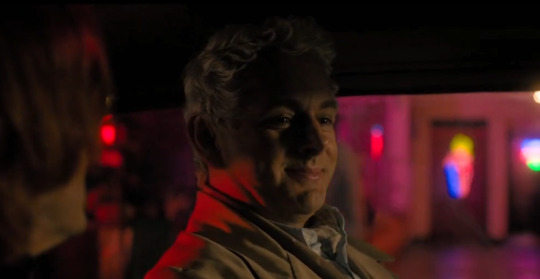
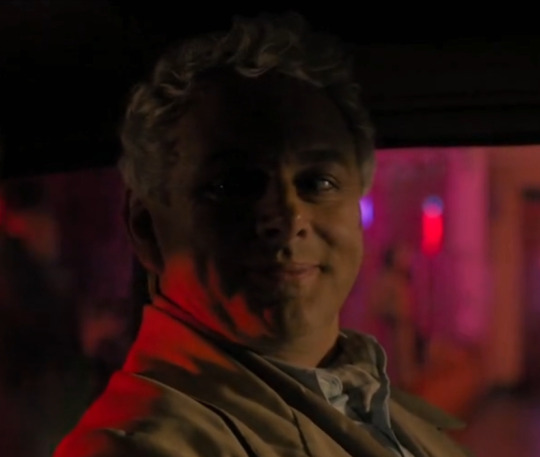
When he asks again, you can just see Crowley's desperation for Aziraphale not to go. It's hard to say how long they'd been apart, but it's safe to say that for them, that previous interaction likely is very fresh in their minds.
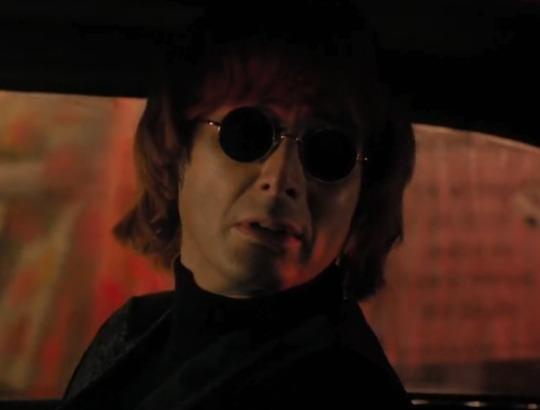
Aziraphale has always been more fearful than Crowley when it comes to their feelings for each other. You could even potentially look at the holy water as a metaphor for their relationship. In his expressions of concern about The Arrangement, Aziraphale has always been remarking on how Crowley could be destroyed, similarly to his words here. So when he's telling him, "You go too fast for me, Crowley," what he's really saying is, "I'm terribly afraid and I'm not ready to take that step if it means that I could lose you." And it's plain to see by the wistful look on his face that it pains him greatly to say it:
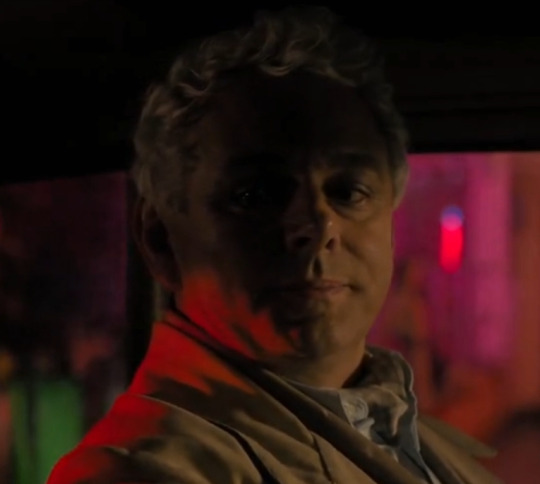
The scene so quickly cuts to Crowley looking intensely at the holy water after Aziraphale has left the car (as if trying to convince you that that was the real point of the scene) that it's easy to miss this devastated expression on Crowley's face:
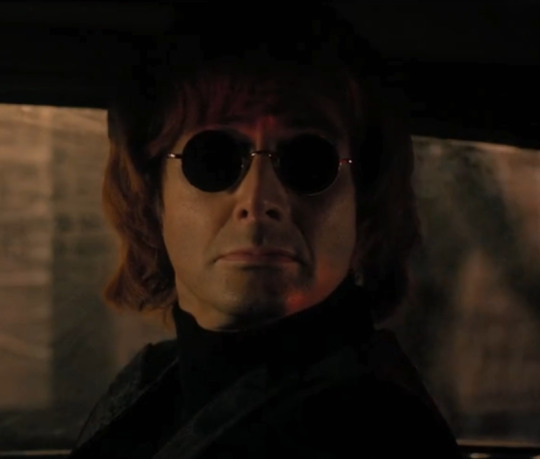
There's no look of perceived rejection on his face. Just a somber look of resignation. There are so many barriers in front of them, and I think that Crowley was willing to risk it but understood that Aziraphale wasn't ready to.
This is the most honest and laid bare we ever see these two be when it comes to their emotions. There's so much being said without being said and even their actual words (i.e. Crowley remembering exactly the amount of time when the 'fraternizing' conversation happened) are so full of emotion that it might even be a bit hard for some people to watch.
It's not awkward. It's just that the scene is just so incredibly earnest and heavy with coded language that it's easy to be swept up by the fact that the two aren't engaged in their typical banter and bickering. What we truly have here is an incredibly difficult and loving conversation between two people who are stuck in a seemingly impossible situation.
#good omens#crowley#aziraphale#ineffable husbands#aziracrow#aziraphale x crowley#michael sheen#david tennant#good omens meta#abel talks meta#good omens through the ages#good omens 1967#signed by an autistic pwBPD with a penchant for over-analyizing tone and body language#anthony j crowley#you go too fast for me crowley
1K notes
·
View notes
Text
No bc Satoru has this whole hallucination-dream-limbo sequence where he’s talking to Suguru about how he wanted to give Sukuna his all to get through to him and show him how he understood his loneliness only to have Suguru go “…you’re making me jealous.”
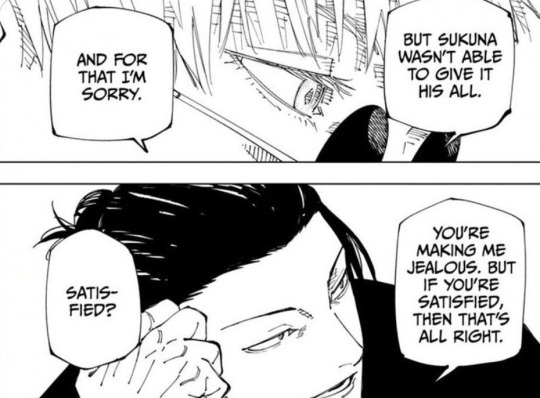
As an author, what Gege did here is genius because that is such a loaded statement to make in response to Satoru processing his fight with Sukuna. It can mean so many different things and we, the audience, are free to interpret exactly how Suguru meant it.
On one hand, you can say he said he was jealous because he wanted to be the one Satoru fought with all his might. He wanted to be as strong as Satoru, to match him in prowess, and hearing that Sukuna was the one to do it instead made him jealous.
On the other hand, you can say that he said he was jealous because Satoru recognized that Sukuna was lonely and wanted to get through to him, something that he was too late to recognize in Suguru when he was descending into madness, and that in turn made Suguru jealous because it was as if Satoru was saying “I recognized the loneliness in him and wanted to do something about it” when he failed to do that same thing with Suguru.
I personally interpret it the second way more (the first one is very valid, but I just see things the second way), because of the next lines.
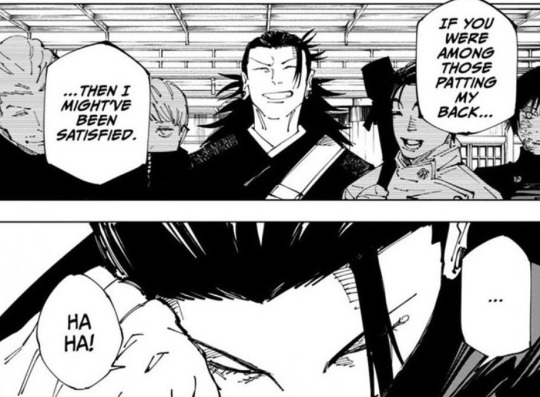
He made Suguru cry. While laughing. Once again, holy shit is that such a loaded scene. What did Suguru’s tears mean? We have never seen him cry before. Not when Riko died, not at any point when he was losing his mind, not even when he died by Satoru’s hand. So why, when Satoru said he wished Suguru was there to wish him luck before he fought, did he finally get brought to such strong emotion that he cried?
Was it because he was happy to hear that Satoru still thought of him, even in his final moments?
Was it because after all these years, Satoru never thought ill of him and pictured him there beside him, and he was relieved?
Was it because he regretted making the choices he did that led to him not being there by Satoru’s side?
Or, in a very indirect way, was it an admission of love from Satoru that made Suguru happy?
I wonder that, because of these panels from Chapter 238:
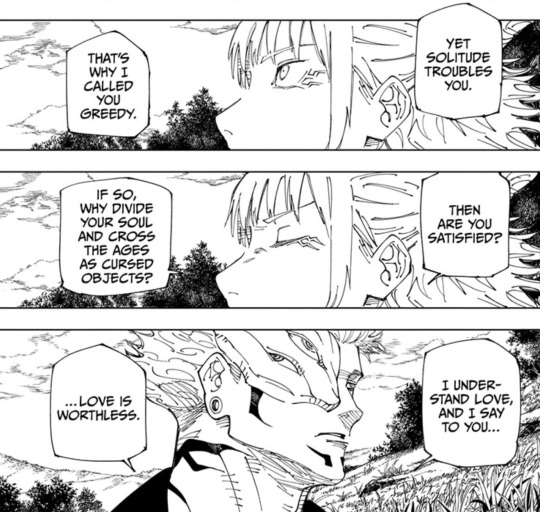
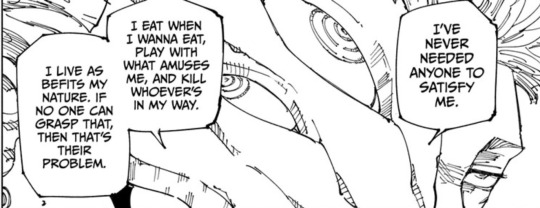
Kashimo asked Sukuna, “if you’re so satisfied being alone, why did you refuse to die and turn yourself into cursed fingers?”
Sukuna’s response is, “Love is worthless. I’ve never needed anyone to satisfy me.”
Which is a directly opposing statement to the one that Satoru had just made to Suguru.
Sukuna: I only have to worry about myself and I get to do as I please. I am satisfied by myself. I don’t need love.
Satoru: I worried about everyone else my entire life and I was controlled by the society. I was not satisfied, but I would have been if you had been there with me, Suguru.
That. Is. Powerful. Those panels imply that love is what made Satoru weak. He did not feel complete because he didn’t have Suguru. He had all of the power in the world, he had status, he had students that depended on him, other friends even, and he still was not satisfied because Suguru wasn’t there.
Sukuna on the other hand recognized how detrimental love was because of what it did to people, how it made them weak, and he decided he didn’t need it.
Those panels were such an indirect-direct conversation between Satoru and Suguru.
Essentially, they were saying:
Suguru: You fought with all of your might and I wish that you recognized my loneliness so that I could have been there with you
Satoru: I was at the peak of my power and I had the weight of the world on my shoulders, and I was allowed to go all-out to fight yet I just wanted you to be there with me
It’s just. Ugh. They’re saying they want each other in the most infuriatingly roundabout way.
#ive been wanting to talk abt this for a minute#just. the language.#satisfaction relative to love#it’s all related#satoru was not satisfied because he didnt have the person he loved#sukuna has abandoned all need for satisfaction and love because they are weaknesses#satosugu#jjk meta#satosugu meta#stsg#sgst#sugusato#satoru gojo#gojo satoru#geto suguru#suguru geto#jjk#jujutsu kaisen#jjk spoilers
2K notes
·
View notes
Note
have you seen the commentary from the p5r artbook going around? the shuake part of my dash is losing it a bit at the implication that their wishes were mutual!!! that seems to be what some people are getting from the commentary at least… amy insights?

Hi! I have been through the artbook. It's great, isn't it? :D
The image above is called "One Ending", and the creator caption (by illustrator Akane Kabayashi) reads:
When I think about how Akechi's wish was to play chess after school with the protagonist, I almost want to call him out with "You liked him after all, didn't you!"
Look at that. We're told about Akechi's wish, and what it included. We're as good as told outright that he likes Joker—and this isn't the only time, there's also this:


—There are a whole lot of things we can imagine, based on how the protagonist was depicted as someone special to Akechi.
Those are more or less the exact emotions represented during Akechi's confidant. (Mumon Usuda, chief designer)
"someone special" here is 特別な存在 tokubetsuna sonzai—literally "a special presence". It means a special person, and more than that; it describes someone you find compelling, someone you can't look away from, someone who becomes one of your most important people, the centre of your world. It's another term that is often romantic, but isn't necessarily romantic.
(In the same way, I think Kabayashi's suki jan! is more tongue-in-cheek than it is a cast-iron confirmation that Akechi was canonly in love with Joker. The language there is teasing, it's ambiguous, it's baity; Kabayashi is joking. This is a rank 6—as they say, if you know, you know. But it is of course ultimately up to all of you.)
There's another mention of this image, down in the creator interview:

Out of all the Maruki ending illustrations, it was Akechi's that stuck with me the most. It made such an impression to see them opening up as friends, having a fun, peaceful time together like high school students should. (Mumon Usuda, chief designer)
What really strikes me in all of this is the emphasis the creators put on the fact that this is Akechi's illustration, Akechi's wish. Because I've thought for a while that we know Akechi has a wish. You can see him struggling with his refusals to Maruki in the first week of January. And you can hear his wish spoken—when Maruki repeats it back to him, during the boss fight, on 2/3:
Maruki
{F1 81}君たちとなら、君も過ちのない道を歩めるかも知れないじゃないか!
{F1 81}-kun-tachi to nara, kimi mo ayamachi no nai michi o ayumeru kamoshirenai ja nai ka!
If you're with {F1 81}―kun and his friends, you could begin to atone for what you've done!
Think about it! With [Amamiya]-kun and his friends beside you, you could choose a path with no mistakes as well!
So this wish has several parts. First, there's that kimi mo, "you also"; it's tempting to read this as Maruki also wanting his new world to erase his past mistakes. Second, there's the first part, "if you're with [Amamiya]-kun and his friends". Where to even start here?
Being with Joker and the others is a prerequisite for the second half of Akechi's wish. It doesn't just coexist, it enables the rest of it. Just like his words in the engine room, "I wonder why we couldn't have met a few years earlier, [Ren]..."
Remember, Akechi's whole arc is about his rejection of trust and friendship, and his insistence on doing everything himself. This is precisely what Futaba calls him out on—"you trusted no one", or "you played life in single-player mode". This is what he unlearns at the climax of the engine room, when he realises he isn't prepared to let the others die—and follows through to save them.
Akechi is nothing without others, and he knows it. Without their support, which he believes he has no right to, he has no hope of living a better life, even were he to be given the chance—and he knows that, too. He has learned, and he has grown—and yet he knows the things he needs and wants so badly are forever inaccessible.
And his wish is about all the Phantom Thieves, not just Joker. There are many tiny references to this end—not least the original Japanese rank 10 line for his confidant, where he sacrifices himself for all of you. Joker is his compelling presence, his someone special, but he's formed small bonds with the others too, God help him.
and then there's the crime thing
The localisation frames Akechi's wish in terms of atonement, but that's not what's on offer. You cannot, after all, atone for things you never did. We see Akechi's wish put into practice, in the Maruki ending, where he appears with his friends beside him, wholly innocent and with unstained hands. And we see it in the first week of January, after he has finally met Maruki and spoken to him:

Akechi: Ah, that reminds me—there was one more thing I wanted to tell you.
Akechi: About the reality Maruki's put us in...
Akechi: It seems that Okumura and Wakaba are both considered alive by all accounts.
[Ren: They're not dead anymore? / What do you mean?]
Akechi: They aren't mere illusions, or cognitive beings—they truly are alive and existing in this world.
Akechi: In fact, their deaths seem to have never taken place at all in this reality.
[Ren: What happened to Shido?]
Akechi: Shido was the only one arrested on the crime of attempting to overthrow the government...
Akechi: It seems the Phantom Thieves were causing a stir in this society as well, but there's no record of your arrest now.
Akechi: Basically, in this reality, you and I haven't committed any crimes.
While Akechi still remembers his crimes, they never took place. They have been undone, and only his lingering memory—and Joker's, at this point—speaks to them. He objects to this on countless levels, he summons all the strength he has to refuse it, but don't make the mistake of thinking that means he doesn't want it. This is Akechi's wish in action.
People are often very certain that Akechi's resolve in the third semester is like iron—that he rejects Maruki's offers right away, is never tempted, never wavers. But that can't be true. We know he's afraid to die. We know about the bad end where you don't complete the Palace, where Akechi says nothing and stares at the floor, seemingly blaming himself internally while all the others blame themselves aloud, for being unable to say no to Maruki's temptations. We know how he responds to this assertion of Maruki's—Maruki, who has perfectly summed up what we know all the other PTs wanted, and who (even if Word of God hadn't just confirmed Akechi's wish) we have, honestly, no reason to doubt.
Because Akechi never refutes this wish that Maruki describes. He never says he doesn't want it. He just rejects it—like all the others, who so desperately want what Maruki could give them. Futaba's mother, Haru's father. Akechi's life, and his innocence. And the people who might have been his friends, if he could dare, one day, to ask.
Akechi is tested just like the others, and the price he pays for his defiance is perhaps the highest of all.
and finally
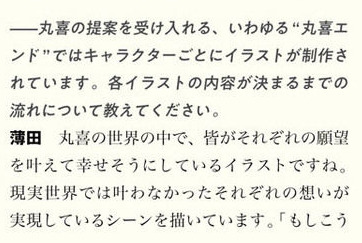
[The Maruki ending illustrations are] of Maruki's world, where everyone's wishes are granted and they seem happy. The scene shows their actualised wishes, which were never granted in the real world. (Mumon Usuda, chief designer)
We shouldn't forget the price Akechi pays for his impossible wish. Sure, the vision of himself being altered like Sumire clearly haunts him, and I'm sure it made the choice easier—but I don't think it made it that easy. Instead of taking the dream Maruki offered him, Akechi chose to face up to what he'd done, and who he'd become; at the very end, in the third semester and in the engine room, he always makes the right choice.
And that choice was taken away from him. Agency over his life and death, his own acts, and who he would even be—Joker and Maruki take it all away from him and make him a puppet, just like Shido.
Maruki's ending isn't pretty.
revision history
Click here for the latest version.
v1.0 (2024/03/29)—first published.
#asks#persona 5#p5 meta#things i translate#japanese language#word of god#shuake#goro akechi#takuto maruki
536 notes
·
View notes
Text
wuxia, xianxia, and cultivation differences meta
translations: wuxia 武俠, xianxia 仙俠, and cultivation 修真/修仙 (xīuzhēn/xīuxiān)
think i've seen posts on this eons ago, and i'm pretty sure there are tons of these online, but since this has been written up already let's just have another one.
wuxia 武俠
wuxia and xianxia sound similar, but basically for wuxia it is about the pugilistic world (江湖 jiānghú). It is relatively more down-to-earth, and people practice martial arts ("kungfu") in their current life -- they do not do it to become xians (仙) and gods (神) however.
Like Thousand Autumns and Faraway Wanderers/Word of Honor, it has more historical background and ties to the current court and kingdoms, because people are living in the moment and concern themselves with worldly issues.
Martial arts may seem unrealistic, but in view of chinese fantasy it would be considered "real". It consists of fighting moves and internal energy, which they call qi or nèigōng (內功), and at times you see people flying around, climbing hills and jumping across rooftops which is qīnggōng (輕功).
xianxia 仙俠
A level up would be xianxia, where characters in the story cultivate to become xians (and gods, like in the heaven official's blessing). They don't really care about earthly issues here now, because their ambitions lie beyond the current world, and cultivation, getting stronger, and an immortal life are majorly all their goals.
You may not always see them working towards that purpose, such as in mdzs they are considered a lower-xianxia society (低魔), meaning people don't go through all the steps of cultivation and only stay at the stage before the "golden core" stage.
In xianxia, characters still learn basic fighting moves aka. martial arts, but to direct the internal energy they use línglì (灵力), zhēnqì (真气), and fǎlì (法力), all xianxia terms you commonly see. "neigong" is practically nonexistent in this genre. That's why people building up their "neigong" instead of "lingli" are likely never going to be able to cultivate.
cultivation 修真/修仙
A subgenre in the xianxia category would be cultivation. Characters actively go through the stages of cultivation, and likely for the MC, because they are the main character, they successfully become a xian and exit the world at the end of the novel.
There are many stages of cultivation, usually defined at the beginning of the novel in the synopsis, and a typical example of the different levels would be this:
练气,筑基,金丹,元婴,化神,炼虚,合体,大乘,渡劫
And with a cursory search, an English translation would be something like this, albeit not with all the cultivation ranks identified.
Qi condensation (练气), Foundation establishment (筑基), Core Formation (金丹), Nascent Soul (元婴), and the names after that vary too greatly with translation and fandom so I'll jump straight to Immortal Ascension
extra info: getting into the philosophy of it all
It'd be interesting to note that the word "xiá" (俠) permeates all these genres. This is something akin to the concept of "hero", but not at all also, and I'd love to speak more on this but this post has already gone way longer than I hoped it would be, so perhaps another day.
Regardless, it is interesting to note that wuxia has a greater emphasis on "xia" than xianxia. (some joke that cultivation doesn't have the word "xia" in it, and much of that is because characters have foregone heroism and focused on gaining powers and working towards ascension instead). As a result, wuxia is more confucianism-oriented, though not without its taoism and buddhism influences.
xianxia, on the other hand, is mainly derived from "dào" (道), from taoism, which is another lengthy concept if I ever get to it.
And some may have heard of the "farming" genre, 种田 (zhòngtián). This has to do with golden fingers (mary sues) in imperialistic china, earning a wealth of money, and all that. It has nothing to do with cultivation, alike they sound in english.
that's it for now, hmu if you wish to ask/discuss!
(and apologies for the pinyin translations, hope it's understandable still! formally writing pinyin they are supposed to be two separate words not one.)
#danmei#mdzs#word of honor#cdrama#thousand autumns#cnovel#wuxia#xianxia#cultivation novel#chinese language#chinese#fate's meta
3K notes
·
View notes
Text

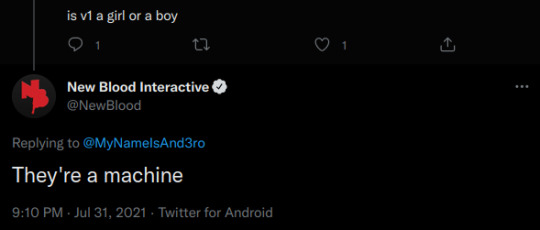



moodboard
#ultrakill#meta#re: the previous post (at least I think. if the queue spits it out correctly)#might also be important to note the finnish language does not have gendered pronouns afaik#anyway. genderless machines real and don't you forget it
7K notes
·
View notes
Text
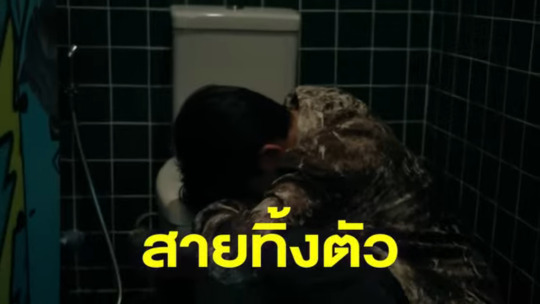
The subs here had "the drunkard", and that's fine and works and is correct, the GMMTV subtitling team knows their shit and I respect them so so so much. BUT. I still got caught on this. Because. The Thai says
สายทิ้งตัว sǎːj tʰíŋ tuːa
and idk how to best translate "สาย" but they're using it like "the one who …" here? which makes this
"the one who [abandoned/discarded/threw away/cast out] himself
and like, yes, that's close to 'the one who's wasted' or indeed 'the drunkard', but in conjunction with how he gets called a burden (ภาระ /pʰaː ráʔ/) over and over even just in this episode—by his friends and strangers alike, and probably his family too— ughhh my feelings.
(disclaimer as always: not fluent, still learning and happy to be corrected on stuff I got wrong)
#only friends the series#only friends เพื่อนต้องห้าม#เพื่อนต้องห้าม#only friends#only friends ep 1#language soup#only friends meta#languages#language meta#my nonsense
507 notes
·
View notes
Text

ถ้ามีรุ้งด้วยก็คงจะดี /thaa mee rung duuay gaaw khohng ja dee/
รุ้ง /rung/ is a rainbow, the entire spectrum of light, all of the colors.
Rung is the name of Mork's sister. So what he says here, could also be read as:
"If Rung was here too, that would be nice."
You know how rainbows are formed? Light refracts in airborne water droplets. And you know what is made of such water droplets and can thus create a rainbow? หมอก /maawk/ - mist, fog, Mork.
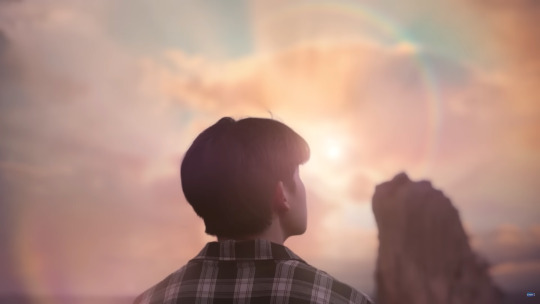
It's not just Day who realized that he can still experience the world in all its beauty. I think Mork also realized that what matters is in your heart. Because he'll always carry Rung with him, wherever he goes.
Rung is all around them.
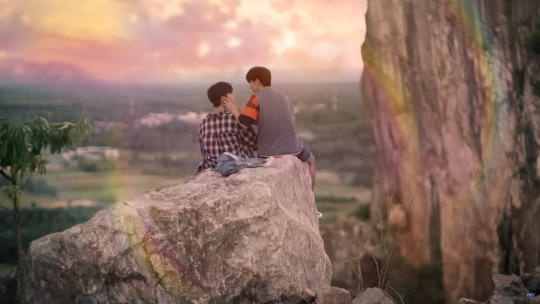
#last twilight#last twilight meta#thai bl#local woman harps on about linguistics#i'm in my feels y'all#the amount of tears i shed ;;#i have a bunch of language notes but i'm too emotional to work on that today
721 notes
·
View notes
Text
okay but can we talk about how fucking good the food would be in the Jedi Temple?? and all of the absolutely fucking baller and totally unique fusion dishes that would have to exist?? they're by far the most diverse group of beings we see in star wars, with lineages made up of people from all across the galaxy. the best food in that galaxy has got to be something from a lineage dinner table that's been made and modified by generations of Jedi and no-one ever wrote down
#making myself emotional in the cantina tonight#something something food and education and cultural exchange as love languages#there's so much room in star wars for deep and meaningful world building#and instead we get 'make it blue so they know it's space food'#Jedi#jedi meta#jedi positivity
981 notes
·
View notes
Text
Deciphering the Angelic Language
DO NOT ASK NEIL ABOUT FAN THEORY

Oh boy, I'm finally tackling a post on this! I haven't seen a ton of discussion about this or progress and I think that's because it's very complicated. I've done a bit of work on it and I'm hoping by sharing here we'll be able to combine our brainpower and make some more progress!
SO! Let's get into it shall we?
Let's start with what we've been told about the Angelic Language:
An SFX team member said that the pillars in heaven "don't translate into words" (so maybe it translates into something like hex? ASCII?)
A speaker at Ineffablecon confirmed that the language "contains meaning and can be decoded"
According to the Chapter 6 VFX Breakdown video, "The creative team broke down the symbols into an alphabet of about 140 runes"
I'm going to start with that last bullet point. An alphabet of about 140 runes, which math-wise narrows down what type of alphabet we might be looking at. Specifically, I think it might point to Consonant/Vowel Pairs, which gives you 126 characters, then add in numbers and punctuation, you've got about 140. That's my best guess anyway.
The next thing i did was look at the Heaven CCTV footage of Gabriel FRAME BY FRAME to analyze the runes on the screen in these scenes. I think this is the best place to start for a number of reasons, first of all, being that the CCTV footage seems to only use a subset of the runes that don't include and modifications like extra dots or ticks. I consider them base runes.
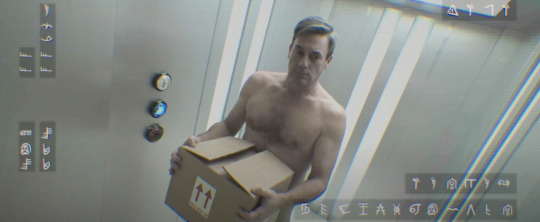
Secondly, the runes cycle through a lot of changes here so it's a great place to look for patterns, and find patterns I did.
I found 4 sets of runes that cycle sequentially through a repeating pattern. Okay I'm going to do my very best to explain this.

The above we will call set A

The above we will call set B

The above we will call set C

The above we will call set D
The runes on the CCTV will *almost* always follow the sequence of their set, and when they reach the end of the set, they're marked with one of the following first two sequences below which I'm referring to as "indicator runes" after which they either repeat the same set or a different set.
The only time the runes change in the middle of a sequence is when they're denoted by the third row indicator runes before the change occurs.
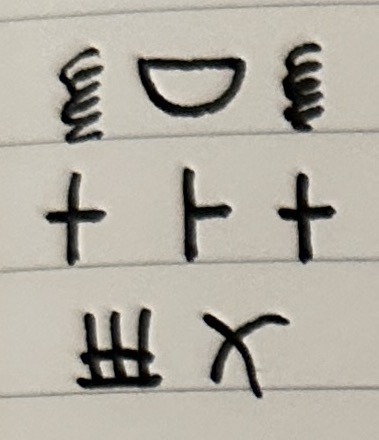
So there does at least seem to be some pattern to the runes, at least when it comes to the ones used in the CCTV footage. These however are only about half of the total number of runes, the other half are derived from these initial ones, and have additional tick marks and dots added to them to add some sort of meaning and differentiation.

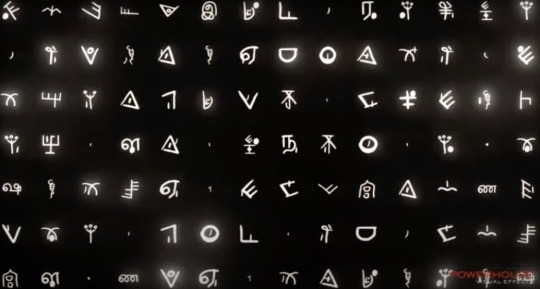
These screen grabs are from the Chapter 6 VFX Breakdown video, and during the lead in to these animations I think I can also say that the language is probably read right to left, as that's the direction the runes scroll in on the screen.
These scenes are also shown with a certain glowing overlay, so I'm wondering if when we can figure the language out, if there is an interesting message here to be read as well.
Anyway! If you have any other info or this has sparked any ideas about the language for you please let me know! I will continue to play with it and update when I have anything of note! :)
#good omens#good omens 2#good omens meta#crowley#aziraphale#crowley x aziraphale#good omens theories#good omens clues#david tennant#michael sheen#good omens fandom#good omens runes#good omens angelic language#good omens clue#good omens theory#ineffable husbands#ineffable idiots#aziracrow#good omens crowley#angelic language
316 notes
·
View notes
Text
unstoppable force (Adam’s canonical teacher kink) meets immovable object (Gansey being a professor’s soul in a teenagers body).
#meta#s speaks#adansey#adam parrish#richard gansey#trc#I’m sorry. but also Maggie wrote this so it’s on her I’m just calling a spade a spade#more insane when you think about their first meeting being Adam teaching Gansey about cars and Gansey teaching him about dead welsh kings#reciprocal informational exchanges defining their whole dynamic in that way … sapiosexual disaster bi bitches#it’s so funny to me that the greenmantle intro scene is def her way of establishing Adam as queer outside of his attraction to Ronan but w/#bringing Gansey into it and yet the description of greenmantle sounds like a combo of Ronan and Gansey#and the language to describe his attraction is a downplayed version of the monologue flashback of Gansey being like the sun…chile anyway.#him thinking Ronan is so attractive I wish I could imagine him as a young hot professor but that’s just not his vibe…#so I take it you’ve imagined Gansey as your history prof many a time okay.#the raven cycle
364 notes
·
View notes